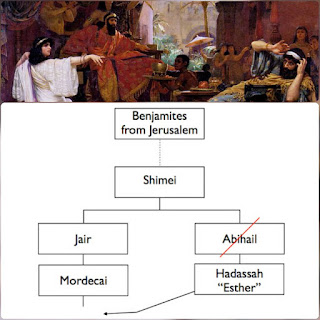LESSONS FROM THE LIFE OF JACOB #82 : BENJAMIN #4
Written by Pastor Christopher Choo
Lesson 3583
LESSONS FROM THE LIFE OF JACOB #82
JACOB'S PROPHECIES ABOUT THE TWELVE TRIBES OF ISRAEL #17
BENJAMIN #4
ESTHER AS A BENJAMITE WARRIOR QUEEN
As a Benjamite, Esther's destiny was to take on the enemy of Israel in the guise of Israel's worst enemy - the Amalekites.
In her time, the notable enemy of her people was the Persian prime minister Haman - an Agagite and the son of Hammedatha.
Haman was likely a descendent of Agag, king of the Amalekites, long-time enemies of the Jewish people.
God had told King Saul a Benjamite to destroy the Amalekites centuries earlier (1 Samuel 15:3), but Saul failed to obey the command. His disobedience led to the loss of his kingdom and, in Esther’s time, the threat of annihilation for all Jews.
So God raised Queen Esther and Mordecai - both Benjamites - to complete his plans and purposes for their prophetic destiny when the Benjamite King Saul failed to do so.
Haman’s goal was the genocide of the Jews, becoming the opponent of Esther and her people in the book of Esther.
Haman had selected the day for the slaughter by casting lots (in Hebrew, Purim). Wanting to make an example of Mordecai, Haman built a special gallows, about 75 feet high, to hang his enemy on (Esther 5:14).
Haman’s hostility toward the Jewish people resulted in his own death.
Proverbs 26:27 held true: “Whoever digs a pit will fall into it; if someone rolls a stone, it will roll back on them.”
On the fateful day appointed for the destruction of the Jews, it was the Jews’ enemies who were destroyed instead (Esther 9:6–9, 16). The ten sons of Haman were also hanged (verse 14). Some historians suggest that they were impaled rather than hung on a high pole.
The Jewish Feast of Purim, a celebration of the deliverance detailed in the book of Esther, is named after the lots that Haman cast. On Purim, the book of Esther is read in the synagogue, and every time the name “Haman” is read, the audience drowns out the sound with ratchet-type noisemakers called graggers (or groggers) or by anything loud and annoying: alarm clocks, toy xylophones, balloons popped with pins, dolls that cry, toy police sirens, whistles, etc.
Haman’s evil name is blotted out symbolically, and Haman’s life is an example of the fate that faces those who oppose God and His people.
Setting oneself against God and persecuting His people is futile—it did not work for Haman, it did not work for Antiochus Epiphanes, it did not work for Adolph Hitler, and it will not work for the Antichrist.

